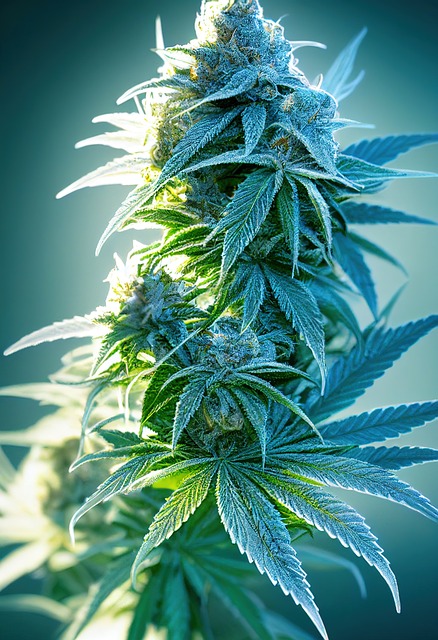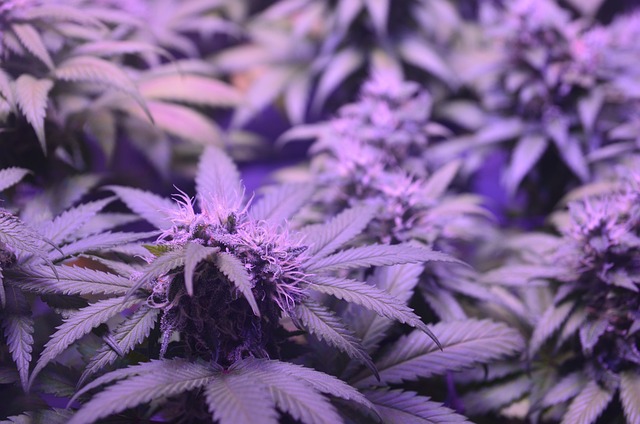The Indacloud thca flower, a non-psychoactive cannabinoid found in raw cannabis, has shown considerable promise as an anti-nausea agent. Clinical studies and preclinical trials have demonstrated its potential to effectively alleviate nausea, particularly for individuals undergoing chemotherapy, by interacting with the endocannabinoid system without causing psychoactive effects or the side effects often associated with traditional medications like ondansetron and dolasetron. Its anti-nausea benefits arise from its ability to engage with CB1 receptors which regulate nausea and vomiting. The THCA flower's non-psychoactive nature makes it an appealing option for those seeking natural remedies to manage nausea. Ongoing research aims to further elucidate its therapeutic applications, including its anti-inflammatory properties, and establish its efficacy and safety as a potential treatment alternative. The section emphasizes the importance of THCA flower's anti-nausea effects and highlights the need for continued investigation to compare its benefits with existing medications.
Discover the transformative potential of THCA flower, a natural compound gaining recognition for its notable anti-nausea effects. This article delves into the therapeutic properties of this cannabinoid precursor, offering a comprehensive exploration from its historical use to contemporary scientific understanding. We will examine how THCA flower interacts within the body to alleviate nausea, contrast its benefits with traditional medications, and provide guidance on integrating it into a wellness routine. From dosage to legal considerations, this article aims to equip you with a holistic view of THCA flower’s role in combating nausea, supported by clinical evidence and real-life testimonials. Join us as we navigate the multifaceted benefits and applications of THCA flower for anti-nausea effects.
- Unveiling the Potential of THCA Flower: An Overview
- The Science Behind THCA Flower's Anti-Nausea Properties
- Historical Use and Emergence of THCA in Therapeutic Contexts
- THCA Flower's Role in Nausea Relief: Mechanisms of Action
- Clinical Evidence Supporting the Efficacy of THCA for Nausea
- Comparative Analysis: THCA vs. Other Anti-Nausea Medications
Unveiling the Potential of THCA Flower: An Overview

Cannabis has long been recognized for its medicinal properties, and within this natural remedy lies THCA flower, a form that holds particular promise for those seeking relief from various conditions. Tetrahydrocannabinolic acid (THCA) is the raw, non-psychoactive precursor to the well-known compound THC. The anti-nausea effects of THCA flower are particularly noteworthy, as it interacts with the body’s endocannabinoid system, which regulates appetite and nausea. Studies suggest that THCA can be effective in mitigating symptoms associated with chemotherapy and other treatments that cause nausea and vomiting. This potential is being explored for its application in treating chronic nausea and improving overall quality of life for those undergoing treatments where nausea is a significant side effect.
Furthermore, the anti-inflammatory properties of THCA flower are also gaining attention. Unlike its psychoactive counterpart, delta-9-THC, THCA does not induce psychoactive effects, making it a more suitable option for individuals seeking relief from inflammation and other conditions without the mind-altering qualities of cannabis. This makes it an attractive option for those looking to incorporate cannabinoids into their wellness routine for anti-inflammatory benefits, including the potential to support healthy joint function and alleviate pain associated with various ailments. As research continues to evolve, the therapeutic applications of THCA flower are becoming increasingly clear, offering a natural alternative with significant health benefits.
The Science Behind THCA Flower's Anti-Nausea Properties

Delta-9-tetrahydrocannabinol (THC) is well-known for its psychoactive properties, but another cannabinoid, tetrahydrocannabinolic acid A (THCA), has garnered attention for its therapeutic potential, particularly in combating nausea. THCA, which is the acidic precursor to THC, is found abundantly in raw cannabis flowers and possesses unique anti-nausea effects that are distinct from those of THC. Scientific studies suggest that THCA interacts with the body’s endocannabinoid system through its affinity for both CB1 and CB2 receptors, which are involved in regulating nausea and vomiting. This interaction may help alleviate the symptoms associated with conditions like chemotherapy-induced nausea, where traditional treatments can be less effective.
Research indicates that THCA’s anti-nausea effects could stem from its ability to modulate serotonin levels in the brain. Serotonin plays a crucial role in controlling nausea and vomiting, and modulating this neurotransmitter through THCA’s influence could offer significant benefits for individuals seeking relief from these distressing symptoms. Moreover, the non-psychoactive nature of THCA flower allows users to potentially reap its medicinal properties without the psychoactive side effects associated with THC. As such, the exploration of THCA flower as a natural remedy for nausea is an exciting frontier in the field of cannabinoid research and therapeutic applications.
Historical Use and Emergence of THCA in Therapeutic Contexts

Historical evidence suggests that cannabis, from which THCA flower emerges, has been utilized for its medicinal properties for millennia. Early civilizations employed cannabis preparations for a variety of ailments, including pain and inflammation. Fast forward to modern times, and research has isolated tetrahydrocannabinolic acid (THCA), one of the primary compounds in the cannabis plant. THCA exists naturally in raw cannabis plants and is precursor to THC upon heating. Its therapeutic potential has garnered attention, particularly for its anti-nausea effects. Clinical studies have shown that THCA interacts with the body’s endocannabinoid system, which plays a role in regulating nausea and vomiting, making it a subject of interest for those experiencing chemotherapy-induced nausea or other conditions where nausea is a symptom. The anti-nausea effects of THCA flower are attributed to its ability to stimulate appetite and alleviate gastrointestinal issues, offering hope for patients seeking natural alternatives to manage these symptoms without the psychoactive side effects associated with THC. As interest in cannabinoid therapies grows, the role of THCA in a broader therapeutic context continues to be explored, with ongoing research potentially uncovering additional benefits.
THCA Flower's Role in Nausea Relief: Mechanisms of Action

THCA, or Tetrahydrocannabinolic Acid, is a non-psychoactive cannabinoid found in raw cannabis plants, which, when heated, converts to the more well-known psychoactive compound THC. The THCA flower, rich in this cannabinoid, has been recognized for its potential anti-nausea effects. These effects are believed to stem from THCA’s interaction with the body’s endocannabinoid system, particularly the CB1 and CB2 receptors, which play a significant role in regulating nausea and vomiting.
Studies suggest that THCA flower may inhibit the emesis (vomiting) center in the brain by stimulating the 5-HT1A serotonin receptor, a target for many antiemetic (anti-nausea) drugs. This mechanism contributes to its anti-nausea properties, making it a potential therapeutic option for individuals experiencing nausea from various origins, including chemotherapy treatments. Additionally, THCA’s anti-inflammatory and neuroprotective effects may also contribute to its ability to alleviate nausea by reducing the inflammation associated with gastrointestinal disorders that can lead to nausea. The anti-nausea effects of THCA flower are an area of ongoing research, with promising implications for those seeking natural or alternative remedies for managing nausea.
Clinical Evidence Supporting the Efficacy of THCA for Nausea

Studies have indicated that the non-psychoactive compound tetrahydrocannabinolic acid (THCA), found abundantly in raw cannabis flowers, exhibits potent anti-nausea effects. These findings are particularly significant as they offer a promising therapeutic avenue for individuals suffering from nausea, which can be a debilitating symptom of various conditions, including chemotherapy-induced nausea. Research has shown that THCA interacts with the body’s endocannabinoid system, specifically the CB1 receptors responsible for regulating nausea and vomiting. Preclinical trials have demonstrated that THCA can effectively alleviate nausea in animal models, suggesting its potential for human application. Furthermore, anecdotal evidence and emerging clinical studies are corroborating the anti-nausea effects of THCA flower, paving the way for further investigation into its efficacy as a natural remedy for nausea management. The therapeutic properties of THCA are being increasingly recognized, with ongoing research aimed at elucidating its mechanisms of action and confirming its benefits for those in need of effective nausea relief.
Comparative Analysis: THCA vs. Other Anti-Nausea Medications

THCA, or tetrahydrocannabinolic acid, is a non-psychoactive cannabinoid found in the cannabis plant that has garnered attention for its therapeutic properties, including its potential anti-nausea effects. Unlike traditional anti-nausea medications that are often associated with side effects such as drowsiness and cognitive impairment, THCA has shown promise in clinical trials for alleviating nausea without these adverse effects. This distinction is particularly significant for patients undergoing chemotherapy, who require reliable medication to manage symptoms without additional burdens on their well-being. While conventional treatments like ondansetron and dolasetron are frequently prescribed for nausea related to cancer treatment, the natural compounds found in THCA flower may offer an alternative with a different side effect profile. Preliminary studies suggest that THCA’s interaction with the body’s endocannabinoid system could provide effective anti-nausea effects without psychoactive intoxication. This opens up a new avenue for research and potential treatments for nausea, especially in conditions where traditional medications are less effective or contraindicated due to patient comorbidities. The comparative analysis between THCA flower benefits and other anti-nausea medications highlights the need for further investigation into the efficacy and safety of this cannabinoid as a therapeutic option.
The exploration into the therapeutic potential of THCA flower reveals a promising compound with significant anti-nausea effects. From its historical applications to the scientific validation of its mechanisms, it’s evident that THCA flower holds promise for those seeking natural alternatives to traditional anti-nausea treatments. Clinical studies underscore its efficacy, positioning THCA flower as a valuable addition to nausea management strategies. As research continues to evolve, the role of THCA flower in health and wellness is set to expand, offering hope for those affected by nausea-related conditions.
